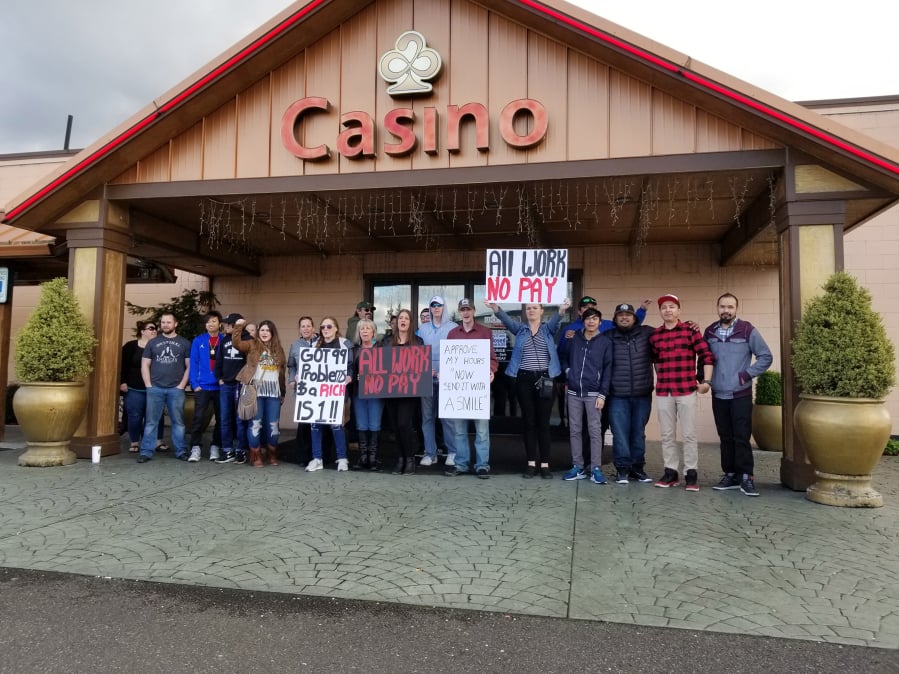The April 8 closure of the Lucky 21 Casino in Woodland — also known as the Oak Tree Casino — left most of the business’s 115 employees not only suddenly unemployed, but also unpaid for their final three weeks of work.
“This was a pay day, so we were all waiting for a paycheck,” said Zhanna Roth-Slatzer, a former floor supervisor and shift manager.
Instead, employees who showed up for work found the doors locked and signs taped to the windows stating that the casino had closed down as of 6 a.m.
Several employees who spoke to The Columbian last week said they had already filed or were planning to file complaints with the Washington Department of Labor and Industries and the Washington State Gambling Commission.
Tim Church, a spokesman for the department, said Monday that his agency had received more than 60 complaints from former Lucky 21 employees in the past week, all of which pertained to unpaid wages.
Many of the employees who spoke to The Columbian directed their frustration at the casino’s general manager, Richard LeMieux, arguing that he failed to warn them that the business was in imminent danger of closing.
“We thought (we’d have) until the end of the summer at least,” said Matthew Srivilai, a former dealer.
Reached for comment Monday, LeMieux said there wasn’t enough money left on the morning of April 8 to make payroll or to open the casino’s cashier cage – the central office and service counter where players buy and cash their chips.
“If we had the money, we would’ve paid,” he said. “(The staff) are angry, and they have the right to be angry.”
However, he pushed back against what he described as unfair accusations that had been leveled at him, such as the idea that he had withheld the payroll money or that he had planned the closure in advance without telling the staff. The decision wasn’t made until the morning of April 8, he said, and it shouldn’t have come as a surprise.
“I’ve been telling people for a year: We’re losing a lot of money, we’ve got to turn things around,” he said.
Friday evening rally
A group of at least 30 former Lucky 21 employees gathered in the parking lot outside the building’s front entrance Friday evening, hoping to speak to LeMieux about their paychecks.
Employees in the group said the gathering had been prompted by a message from LeMieux telling the casino’s dealers to come pick up checks for their tips. Under Washington law, half of the tip money collected by cardroom dealers needs to be placed in a separate fund until it can be added to the dealers’ next paychecks.
The employees notified each other about the message using a private Facebook group, and the dealers were joined on Friday by many of the wait staff and supervisors, some of whom carried protest signs. The group remained outside the building for about two hours.
Many of the former employees at Friday’s gathering didn’t have tip paychecks coming, but said they joined the group anyway as a show of solidarity.
“I got mine in direct deposit,” said former dealer Steven Stein. “I just came to show (LeMieux) we’re all here and we’re really mad.”
The employee group was joined by several customers seeking to cash in chips that they had won at previous visits.
Several employees said LeMieux was inside the building, but he did not emerge during the impromptu demonstration. A former security employee distributed a stack of envelopes with the tip checks, which he said LeMieux had handed to him, but no regular paychecks were distributed.
“Everyone who was on hourly or salary, we’re screwed,” said Chantalle Gipson, who worked as a waitress and front-of-the-house manager.
A few employees were eventually allowed to enter the building and retrieved some personal belongings. But after they emerged, they said no further discussion about the payroll situation had taken place.
Employees at the gathering offered similar accounts of Lucky 21’s performance in recent months: the casino had been losing money, and the staff believed it would likely shut down at some point. But no one expected that the closure would happen on April 8.
“I figured the closure was coming, but not (the staff) not getting paid,” said Amy Spain, who worked as a dealer and floor supervisor.
Casino losing money
Reached for comment on Monday, LeMieux said he disputed the idea that the closure was planned, and said he had done his best to save the casino.
LeMieux took over as the general manager in October 2017, at a time when Lucky 21 had already been losing money. According to the 2017 financial statement from the casino, the most recent available from the Washington State GamblingCommission, the casino operated at a $365,527 deficit for that year.
Despite his best efforts, LeMieux said he was unable to change the trend. The casino only turned a profit in two of the past 18 months, he said, and generally operated like a household living paycheck-to-paycheck.
There were a few break-even months, he said, but on average the business lost $150,000 a month, for a total of $1.6 million lost in the time since he took over.
LeMieux said he decided to run a big promotion in the first week of April with the goal of bringing in a large amount of money that could get Lucky 21 through the rest of the pay cycle. Instead, he said, the casino had its worst week since he started, losing another $150,000.
“We absolutely got murdered,” he said.
Washington law requires casinos to have a minimum amount of money in the cashier cage based on the maximum jackpot and number of gaming tables. For Lucky 21, the minimum was about $45,000.
The casino had just enough money left in the cage to open up April 7, LeMieux said, but it lost even more over the course of the day. LeMieux said he stayed up through most of the night exploring options to keep the doors open, but wasn’t able to come up with a plan.
“It was Sunday night and there’s just no money left,” he said. “I didn’t know we were closing at 6 a.m. until 6 a.m.”
LeMieux blamed Lucky 21’s ongoing financial troubles on a variety of factors, one of which was competition from ilani and other nearby cardrooms and casinos. Ultimately though, LeMieux said the casino appeared to simply have chronic bad luck.
“This casino defied all mathematical odds, and I cannot explain it,” he said.
Future
LeMieux said the casino has about $20,000 left, but he doesn’t know if he’s allowed to spend it on payroll expenses or if other debts have to take priority.
“That’s up to the liquidation lawyers,” he said. “We don’t know what we’re supposed to do.”
According spokeswoman Heather Songer, the Washington State Gambling Commission does not have authority over payroll disputes, and has instructed its staff to refer complaints from Lucky 21 employees to the Department of Labor and Industries.
Church said the Department of Labor and Industries will investigate the complaints about Lucky 21 and determine whether action needs to be taken. That process is usually completed within 60 days, he said, but the large number of complaints in this case could take longer to process.
Lucky 21’s cardroom license is still valid until the end of June and the casino could technically reopen before then, Songer said, although it would need to meet certain requirements and receive gambling commission approval.
But that’s unlikely to happen. After his own experience and those of his predecessors, LeMieux said he’s confident that no one else is going to want to give Lucky 21 a shot.
“There will never be another casino there,” he said.




